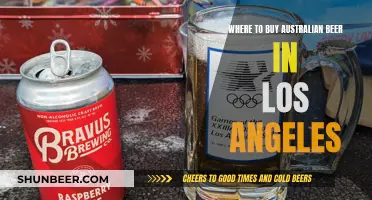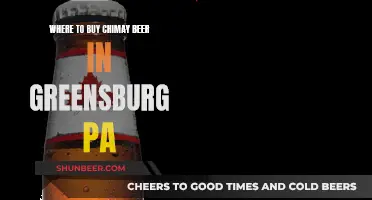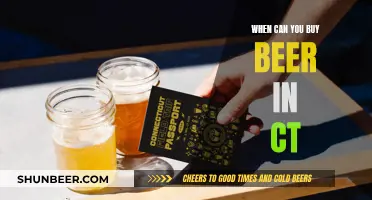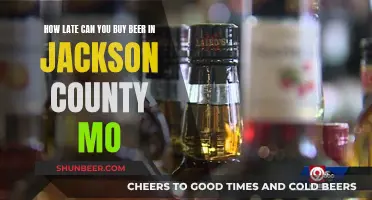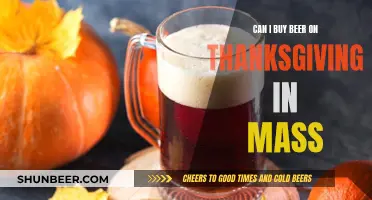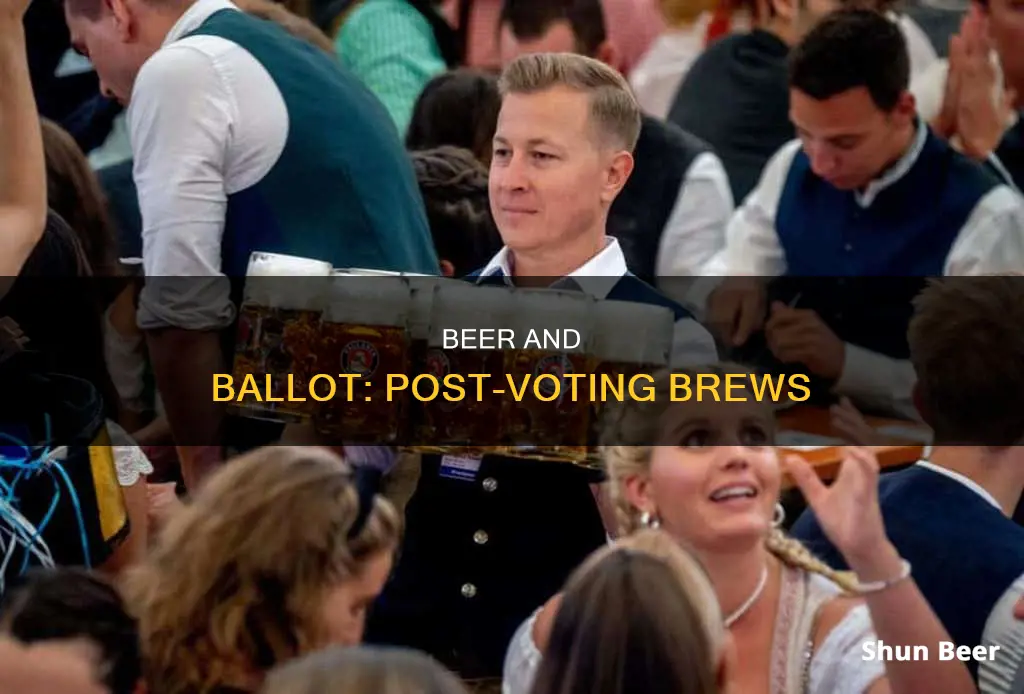
In the United States, an age-old law banned citizens from buying alcohol on Election Day. However, as of 2014, when South Carolina became the last mainland state to repeal this law, it is now legal to buy alcohol on Election Day across the contiguous United States. Only certain parts of Alaska, Puerto Rico, and Massachusetts have Election Day dry laws in place. Outside the US, several Latin American countries still enforce dry laws during elections, including Argentina, Brazil, Chile, Colombia, Costa Rica, and more.
What You'll Learn
- Alcohol sales are banned in some countries on election day
- In the US, alcohol sales were banned on election day until 2014
- In some countries, alcohol sales are banned before, during, and after elections
- In the US, alcohol was used to persuade voters before the prohibition era
- Some restaurants offer free or discounted drinks to those who voted

Alcohol sales are banned in some countries on election day
The practice of polling day prohibition has its roots in the era predating Prohibition, when political candidates would provide free-flowing liquor to influence undecided voters. Banning alcohol sales on election days was, therefore, a way to police the candidates rather than the citizens.
In Latin America, countries such as Argentina, Brazil, Chile, Colombia, Costa Rica, Ecuador, Guatemala, the Dominican Republic, Mexico, Panama, Peru, Uruguay, and Venezuela enforce "ley seca" or "dry laws", prohibiting the sale and public consumption of alcohol before, during, and after elections. These laws can be enforced for varying durations, ranging from 24 to 72 hours, depending on the country.
Unlabeled Beer: Can You Legally Buy It?
You may want to see also

In the US, alcohol sales were banned on election day until 2014
In the US, it was not possible to buy alcohol on election day until recently. The roots of this prohibition lie in the pre-Prohibition era, when political candidates would provide free-flowing liquor to influence undecided voters. Even George Washington was allegedly guilty of this.
Maryland was the first US state to establish an Election Day alcohol ban in 1811, and other states soon followed suit. After the 21st Amendment passed in 1933, and alcohol was once again legalized, most states continued to impose some form of Election Day alcohol control.
However, in recent years, there has been a push to roll back these laws, with South Carolina becoming the last mainland US state to repeal its Election Day alcohol ban in 2014. As of 2023, only certain parts of Alaska, Puerto Rico, and Massachusetts have Election Day dry laws in place.
The repeal of these laws has been welcomed by many, who see the prohibition of alcohol sales on Election Day as an antiquated and condescending notion. The Distilled Spirits Council of the United States (DISCUS) has aggressively supported rolling back these laws, with Vice President David Wojnar calling them a "ridiculous relic of the Prohibition era".
Today, Election Day is a popular time for people to visit their favourite bars and liquor stores, whether they are celebrating wins, mourning losses, or simply dealing with the stress of the election.
Best Places to Buy Cristal Beer
You may want to see also

In some countries, alcohol sales are banned before, during, and after elections
Similarly, many Latin American countries, including Argentina, Brazil, Chile, Colombia, Costa Rica, Ecuador, Guatemala, the Dominican Republic, Mexico, Panama, Peru, Uruguay, and Venezuela, have strict "dry laws" or leyes secas, prohibiting the sale and public consumption of alcohol before, during, and after elections. The timing of these bans varies by country, with Argentina's laws taking effect at 8 p.m. the night before polls open and Peru's lasting for 48 hours, starting on Saturday morning. Ecuador has the longest alcohol ban, lasting 72 hours, and has been known to detain those who violate the law.
The tradition of polling day prohibition has curious roots. Historically, political candidates would ensure liquor flowed freely on election days to influence voters. Banning alcohol sales during elections was, therefore, a way to police the candidates rather than the citizens. While this practice may seem outdated or condescending to some, it continues to be enforced in several countries and jurisdictions around the world.
The Best Places to Buy Blatz Beer
You may want to see also

In the US, alcohol was used to persuade voters before the prohibition era
In the US, the sale of alcohol is banned on election days in certain parts of the country. This is due to an old law that was established to prevent candidates from using alcohol to persuade undecided voters. Before the Prohibition era, candidates would supply free-flowing liquor to voters, with even George Washington allegedly taking part in this practice.
Maryland was the first state to establish an Election Day alcohol ban in 1811, and other states soon followed suit. Over time, most states repealed this law, with South Carolina being the last mainland state to officially roll it back in 2014. As of 2023, only certain parts of Alaska, Puerto Rico, and Massachusetts have Election Day dry laws in place.
The use of alcohol to influence voters was not limited to Election Day. In the late 19th and early 20th centuries, saloons were common polling places, and it was not uncommon for people to get others liquored up to sway their votes. This practice contributed to the negative perception of saloons, which were often associated with gambling and prostitution. The proliferation of saloons and the culture of drinking among some sectors of the population alarmed the leaders of the prohibition movement, leading to the enactment of Prohibition in the 1920s.
While the US has moved away from banning alcohol sales on Election Day, several Latin American countries, including Argentina, Brazil, and Mexico, still enforce strict "dry laws" during elections.
Buying Beer in Utah: What's the Deal?
You may want to see also

Some restaurants offer free or discounted drinks to those who voted
In the United States, an age-old law banned citizens from buying alcohol on election day. While this law has been repealed in most states, some restaurants and bars offer free or discounted drinks to those who voted, as an incentive to fulfil their civic duty.
In Houston, Texas, for example, Axelrad gives voters a free drink with their "I voted" sticker, while Betelgeuse offers happy hour pricing all day. Both locations of Italian restaurant Piola give free margherita pizzas to voters, with the offer only available on election day and requiring the purchase of a beverage. In Austin, Texas, Austin Beerworks offers a free beer on election day to people with their voting stickers, and Banger's offers half off any appetizer with sticker proof.
In 2020, Chili's offered $5 Presidente Margaritas to those who showed support for the "Marg Party".
Buying Beer in Clemson, SC: Sunday Laws Explained
You may want to see also
Frequently asked questions
It depends on where you live. In the contiguous US, there are no Election Day alcohol restrictions. However, certain parts of Alaska, Puerto Rico, and Massachusetts may still have dry laws in place.
Before the prohibition era, candidates would try to get inebriated people to vote for their candidate or entice them with alcohol during the campaign season.
Yes, several countries in Latin America, including Argentina, Brazil, Chile, Colombia, Costa Rica, Ecuador, Guatemala, the Dominican Republic, Mexico, Panama, Peru, Uruguay, and Venezuela, have strict "dry laws" in place for Election Day.
Yes, South Carolina was the last mainland state to officially roll back its Election Day alcohol ban in 2014. Other states that have recently lifted the ban include North Carolina in 2013, Indiana in 2012, and Kentucky in 2016.
No, you must be 21 or older to purchase alcohol in the US.


